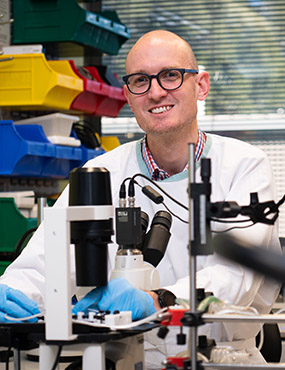From steel to stiffened arteries
Mark Butlin’s doctorate in biomedical engineering took him from Wollongong’s steelworks to researching arteries and blood pressure.

Research in collaboration with clinicians
Working with biomedical engineer Professor Alberto Avolio and cardiologist Associate Professor Edward Barin, Dr Mark Butlin leads a cross-disciplinary team of clinicians, physiotherapists and engineers. They’re trying to better understand the progression of arteriosclerosis, the stiffening of arteries that happens irreversibly with age.
Butlin came to MQ Health 12 years ago, attracted by the model of having a hospital onsite. “Having clinicians embedded in our team makes collaborating so much easier,” he says.
His team is also exploring autonomic function – how the brain controls respiration and blood pressure. MQ Health has Sydney’s only clinic dealing with blood pressure and autonomic function. “Our research crosses right into the clinical sphere, which means our patients benefit from our latest published research,” he says.
Ten years ago, Butlin’s team developed a device that measures blood pressure near the heart, giving more information than blood pressure measured at the arm, and built a self-contained blood pressure cuff with sensors.
They are now involved in a multi-centre international trial using devices that monitor people who have high blood pressure outside the clinic but present as normal in the clinic. Patients go home wearing a device for 24 hours that reports the measurements back to the clinic, where clinicians can assess their blood pressure.
“Patients are taking part in monitoring their own health,” he says. “We also want to involve them in understanding their results and treatment.”
His team is also developing a cuff-less blood pressure monitor and other novel methods that are still in their infancy, such as measuring blood pressure through video.
Butlin teaches in the Bachelor of Clinical Science, Master of Research and Doctor of Medicine programs. “I really like demonstrating that we don’t know everything, that there’s uncertainty in knowledge, and that we should be continually re-evaluating what we’re doing,” he says. “This can be a bit challenging, particularly for undergraduate students – but it’s a lot of fun too.”